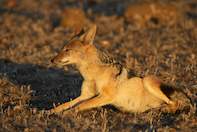
Predation Management South Africa (PMSA) was established in July 2009 and provides a platform for information exchange and coordination of activities within the livestock and game farming sectors.
South Africa has a long history of human-predator conflict, escalated by large-scale farming operations. Although predation ‘management’ has been a practice since the 18th century, management on a wide-scale was only introduced in the 1950s.
Information on common predators and their livestock targets was first disseminated in the Western Cape, Orange Free State, Transvaal and KwaZulu-Natal. They were the first provinces to support responsible predation management, and a collection of research, official reports and scientific evidence was collected to form a factual record to base best predation management practices on.
In 1987, the National Wool Growers’ Association of South Africa noticed an increase in sheep deaths, and subsequently formed a Problem Animal Sub-committee to manage and control predator activities.
The Red Meat Producers’ Organisation came on board and in 1989 the National Problem Animal Policy Committee was established. By 1994, ongoing efforts between the department of environmental affairs and the department of agriculture had yielded some coordinated predation management.
There was, however, a larger need for management, and smaller committees were founded in individual provinces, such as the Livestock and Wildlife Working Group on Damage Causing Animals in the Eastern Cape.
In 2013, the Predator Management Forum launched an initiative in partnership with the Western Cape Nature Conservation Board trading as CapeNature to establish a system of coordinated predation management in South Africa.
The livestock industries have established the Predation Management Forum (PMF) as a representative structure in organised agriculture's management of wildlife-human conflict.
 Livestock farmers suffer losses in the region of R2 billion each year due to predators, such as black-backed jackal, caracal, leopard, cheet...
Livestock farmers suffer losses in the region of R2 billion each year due to predators, such as black-backed jackal, caracal, leopard, cheet...